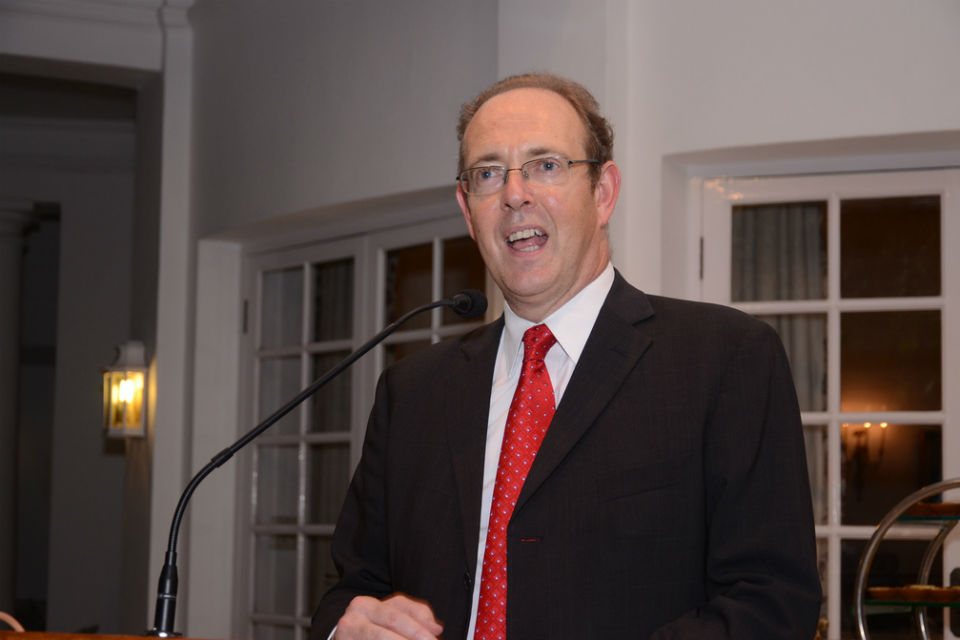International Women’s Day 2014
Transcript of a speech on International Women’s Day event in New Delhi, Saturday 8 March 2014, by Sir James Bevan KCMG, UK High Commissioner to India.

[Ladies and gentlemen, distinguished guests, friends and colleagues]
Let me start with a quotation, supplied to me by one of my daughters:
“Whatever women do, they must do it twice as well as men to be thought half as good. Luckily this is not difficult.”
So if this speech is only half as good as most of the other speeches you will hear tonight, I apologise in advance.
International Women’s Day matters to me personally. I am the very proud father of three daughters and no sons and I would not change that for a moment. My ultimate boss is a woman – Her Majesty Queen Elizabeth II.
Much of my life has been spent in developing countries: and I have seen with my own eyes that if there is a magic bullet for successful development it can be summed up in two words: educate girls.
I love this great country of India and I want it to thrive in the 21st century. I believe that it will do so, but only if it unleashes the talent and full potential of all of its population, not just the half who happen like me to have XY chromosomes.
International Women’s Day is important also to the British government I represent. My government believes in equality and in opportunity for all, and we work hard at home and abroad to promote it.
That’s why my Prime Minister, David Cameron, in his own speech celebrating today, has vowed to make 2014 the year Britain will redouble its efforts to end violence and discrimination against women. We will do that in particular by stepping up our action to fight Female Genital Mutilation and forced marriage, both in Britain and around the world.
The UK’s Department for International Development has put women and girls at the heart of its work here in India.
With our Indian partners, many represented here tonight, DFID is helping get hundreds of thousands of girls into secondary education and helping ensure that they stay there. We are giving women access to finance and the skills they need to support themselves. We are helping women give birth safely and have children by choice. We are promoting children’s health and nutrition. And we are working to reduce violence against women and girls.
Most recently we supported the creation of a new mobile app, Safetypin, which allows the user to create and consult a safety audit of a particular area – street lighting, public transport, how secure it feels to walk there, etc – designed in particular to help women take back the streets and stay safe. Check it out.
And tonight, again with support from DFID, we are launching another important initiative for women: a new TV serial which begins this evening on Doordarshan, Main Kuch Bhi Kar Sakti Hun. (I, a woman, can do anything).
This tells an exciting story, which I hope will be required viewing for millions. But it also conveys some serious messages: about the evils of sex selective abortion and the dangers of early marriage, and about the benefits of family planning and birth spacing.
I would like to thank all of you for coming, and thank you too for all that you do to advance the cause of women.
I would also like to thank everyone associated with organising tonight’s event: in particular our hosts the British Council, DFID and their partners in the Population Foundation of India.
Let me conclude with three more quotations which seem to me to be appropriate for this evening’s celebration.
The first is from American writer Alice Walker, and it’s this: “The most common way people give up their power is by thinking that they don’t have any”. All of us in this room have a lot of power, perhaps more than we know. The women of India and the world have infinitely more. Let us resolve to use our power to the maximum.
The second saying is this: “Feminism is the radical notion that women are people”. I urge the world to be radical.
And my final quotation is another one that my daughters sometimes quote to me: “Well-behaved women seldom make history.” I encourage all of you to go out and behave very badly.